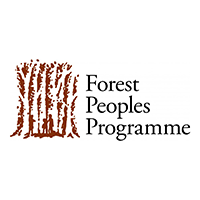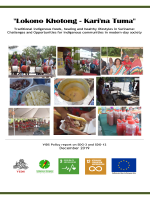VIDS - Suriname - Healthy Indigenous Lifestyle
One of the project components (output 2.1) was about documenting Indigenous peoples’ human development situation with regard to key SDG-themes such as food security, health, education, access to social protection and employment, and communicating these to governmental and non-government development actors.
was produced within the context of the Indigenous Navigator Project, an EC-funded pilot program on indigenous peoples’ data collection and the Sustainable Development Goals, which the Association of Indigenous Village Leaders in Suriname (VIDS) is implementing in Suriname.
One of the project components (output 2.1) was about documenting Indigenous peoples’ human development situation with regard to key SDG-themes such as food security, health, education, access to social protection and employment, and communicating these to governmental and non-government development actors.
VIDS decided to focus this research and dialogue with communities and policymakers on the topic of traditional foods, health and lifestyles, as this is considered a key issue for most communities in the interior, facing a lot of pressures and changes with negative effects for communities’ wellbeing. For instance, discussions within communities uncovered concerns regarding the increased incidence of chronic diseases, such as high blood pressure and diabetes, that are linked to the change of consumption patterns and communities’ traditional territories.
Highlighting and celebrating the importance and sophistication of indigenous traditional practices and food and health systems was therefore prioritized, culminating in a culinary festival and healthy lifestyle event on the national and international day of indigenous peoples, August 9th 2019.
A series of events was organized in 2019 that contributed to this report:
- A workshop: "Healthy lifestyle in harmony with nature" on May 18th in Pierrekondre-Kumbasi, to identify key issues and develop recommendations on traditional foods, medicine and health;
- An event on Healthy Lifestyle and culinary festival on 9th August, including a ‘cook out’ with traditional dishes, and two lectures/workshops on traditional medicine and healing.
These events served to promote an increased awareness, both within the communities as well as among the government and general society in Suriname, of the value of indigenous traditional food and medicinal plants and the need for legal recognition of traditional territories. By promoting traditional indigenous food and medicines, these events aim to contribute to healthier communities and an increased valuation of indigenous food nationwide, which can lead to a larger agricultural production as well.
The report aims to empower the indigenous community in Suriname to engage in national
policy on health in indigenous communities as it underscores SDG 3 (Good health and wellbeing) and SDG 12 (Ensure sustainable consumption and production patterns).
It contains an overview of key issues emerging from discussions with communities and experts during the events in 2019, and a list of recommended actions for communities themselves as well as for policy-makers and institutions engaged in areas of relevance on these SDGs.
Read the report:
The project is funded by European Commission - Development & Cooperation - EuropeAid, channelled by Forest Peoples Programme (FPP) executed by VIDS in Suriname under the Indigenous Navigator Initiative.

